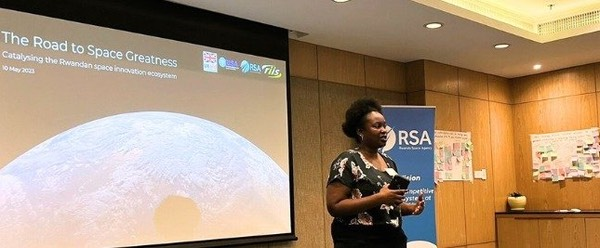
The Research Institute for Innovation and Sustainability (RIIS) and the Rwanda Space Agency (RSA) recently hosted a multi-stakeholder workshop in Rwanda in support of the space agency’s drive to harness emerging space opportunities and support Rwanda’s socio-economic development goals by building a vibrant and robust space innovation ecosystem. The project to develop this ecosystem is funded by the United Kingdom Foreign Commonwealth and Development Office (UKFCDO) under the Research Innovations Systems Africa (RISA) programme.
The workshop brought together government, academia, industry, incubators and accelerators to co-create interventions intended to grow the space innovation ecosystem in the country. “The workshop served as a catalyst to enable innovation, co-creation, and collaboration through a design thinking approach,” says Imraan Saloojee of RIIS. “There is immense value in using space as a vantage point for solutions on Earth. The work being done in this project enables these solutions and will have a lasting impact in Rwanda.”
The workshop is one of a series of engagement and co-creation processes with stakeholders to develop and validate ideas for the space innovation ecosystem roadmap. Among the participants were Digital Earth Africa, an organisation focused on making Earth observation (EO) data free and accessible; Esri, a global leader in geographic information system (GIS) software, location intelligence, and mapping; The Women in Business Initiative, a start-up support programme for women entrepreneurs; Kumva Insights, an organisation that develops remote sensing technology to aid smarter decision-making in hard-to-reach African environments; Locus Dynamics, an aerospace component manufacturer; Zipline, a developer of autonomous delivery systems; and Kigali Innovation City, a growing technology hub for Rwanda.
Saloojee says that the Rwanda space innovation ecosystem project aims to encourage and nurture an environment that allows the private sector to innovate with downstream data and provide much-needed insights and services. “Developing ways to harness, interpret and use space data, particularly commercially, requires a high degree of innovation. We see the private sector as the engine room of innovation, and our project is focused on that portion of the space value chain. The major challenge is that space is an expensive game and the nature of it has changed globally. Once the domain of government, we now see a major need for the private sector to fund and innovate. This is particularly apparent in ICTs, big data, AI and machine learning. We are developing capabilities to harness space data to provide new intelligence. Rwanda has a bourgeoning ICT sector that can be leveraged to produce innovative applications.”
When it comes to the next steps, Saloojee says engaging a broader value chain of stakeholders is critical, from academia and scientists, to industry specialists, to policymakers and end-users. “There is a need to identify and develop Earth Observation-based applications that support growth opportunities based on third party data. Start-ups need to know what the opportunities are. Sectors, for example agriculture, need to engage on the issues they face and know how data may provide solutions. Innovators need to understand the opportunities to develop applications that translate the data into usable information.”
As RIIS works with stakeholders to develop the roadmap, the organisation is raising awareness about benefits of space-based data, the role of the private sector and the benefits for the private sector, and will soon move into creating interventions to further strengthen the ecosystem. Funding is essential and many opportunities abound, according to Saloojee. “We would like to crowd in funders who see linkages with their work and building up the sector. For example, a development aid agency or venture capitalists who see the potential of good quality start-ups, or incubators in the ICT sector who need to focus more on space.”
Collaboration is critical and the RSA has embarked on an ambitious mission to ensure that every facet of the space ecosystem, including research, education and entrepreneurship, is engaged, says Colonel Francis Ngabo, CEO of the RSA. “Our vision is to create an inclusive platform where every Rwandan can reap the benefits of space technologies and ground-breaking innovations, for example, harnessing the power of satellite data and establishing reliable space communication to connect remote communities to facilitate education and healthcare opportunities. This workshop marks a significant milestone in our comprehensive plans for the next ten years.”
Col. Ngabo noted an example of Rwanda’s new capabilities came into play with the Mwulire Ground Stations supporting Lunar Missions through RSA’s strategic partnership with Atlas Ground to use a teleport in Mwurire, Rwanda — the teleport will feature a 9.3-meter antenna in different frequency bands capable of servicing spacecraft on lunar missions.
Rwanda has made progress towards harnessing space technology in socio-economic development in order to ensure a strong contribution to Rwanda’s development agenda. RSA is embedded in supporting existing initiatives of the government of Rwanda, such as Vision 2050 working with many institutions including the Rwanda Water Resources Board, primarily locally. Further afield, there has been a strong push for space diplomacy. African governments are exploring how they can harness space as a solid evidence-based source of data for decision-making when it comes to disaster, disease, environmental and resource management.
Col. Ngabo says the workshop was a clear message to Rwandan business and broader stakeholders. “Join us on this transformative journey towards sustainable development and societal empowerment. Together, let’s make Rwanda a strategic player in space technology, uplifting the lives of all Rwandans and indeed the region.” (End).
